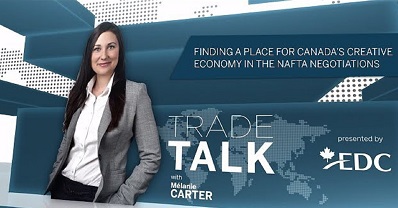American foreign policy has in large part been built on the export of their cultural ideology and while Canadians have certainly enjoyed the tales of Hollywood and the rhythms of Nashville, New Orleans, and Detroit, there is no doubt that if we are to keep the uniqueness of our national dream alive we must be constantly aware of the velvet-trap south of the border.
But now the digital age is upon us with all its wonders and conveniences. However, the words of former Prime Minister Pierre Trudeau have never been more appropriate than they were back in 1969 when he teased the Washington Press Club:
Living next to you is in some ways like sleeping with an elephant. No matter how friendly and even-tempered is the beast … one is affected by every twitch and grunt.
And nowhere is the struggle to preserve an ‘identity’ more clear focused than it is in Quebec which finds itself alone on a continent of almost 300-million English speakers.
The great linguist, philosopher, and historian Noam Chomsky argues that language is more than a tool of communication it is the “preservation of a safe social space”. It is how we share our commonalities, how we pass on the wisdom of our ancestors, how we tell our grandmother that we love her, and how we define ourselves as a community. If the struggle to preserve our values and chart a course towards a unique future is difficult for English Canadians, for French Canadians the challenge is a magnitude many times greater – after all they sleep with both the elephant and the mouse.
Today … content producers on both sides of Canada’s ‘Two Solitudes’ share this ‘age of anxiety’ as we all pay close attention to the on-going NAFTA talks.
Culture is the uninvited visitor at the NAFTA table. It is not on the agenda – yet, however its presence is clearly felt. Dr. Meredith Lilly, an Associate Professor at the Norman Paterson School of International Affairs at Carleton University and an observer at the recent Washington round noted:
There is behind-the-scenes lobbying from America’s culture industries to make it a topic of discussion.
“There can be no liberty complete, no democracy supreme, if commercial interests dominate the vast, majestic resource of broadcasting.”
-Graham Fry
Over the decades … governments of all persuasions have listened.
The CBC. The National Film Board. The CRTC. The Juno Awards. The Canadian Media Fund. The CAVCO and provincial tax credit systems, time and time again our politicians have interceded into the cultural arena sharing a belief that Canadian democracy is better served when we control the telling of our history rather than the entrepreneurs of New York or Hollywood.
But now – or so we are told: everything old is new again. And the manner in which Canadians protect our culture is on the table. The NAFTA re-negotiations have alarmed farmers, and loggers, and auto workers, alike. Perhaps writers, and musicians, and film producers will be next?
For the past 30 years Canada has built a vibrant cultural community shielded, in large part – by a series of ‘cultural exemptions’ which were included in the original 1987 Free Trade Agreement with the United States.
These exemptions created the financial framework that gave rise to a generation of Canadian creators who exported content around the world. The FTA was a major ‘win’ for Canada’s cultural exporters and tens of thousands of Canadians have benefited ever since from the resilience and skill of our negotiators.
Broadcast quotas, financial subsidies, tax payer investment in public agencies (such as the CBC, the NFB, TVOntario etc.), plus regulations mandating distributors contribute financially to the making of television programs and films have protected producers from free market competition. They have kept the Americans at bay and helped grow an industry.
But the entertainment lobby is one of the most powerful in the United States. And Canada’s highly regarded federal and provincial tax credit incentives is an obvious target. These tax credits, which in some instances can return half the cost of an eligible production to producers, has brought hundreds of productions north of the border. Now however many southern US states (Georgia, Alabama, Louisiana, South Carolina etc.) are beginning to offer their own tax credit rebates. Plus – in a turn of events that has alarmed Canadian producers, they may also have the administration’s ear.
In 1997 foreign film production in Canada was practically moribund. British Colombia and Ontario reflected a yearly growth of a meagre 3% of provincial GDP. The next year however, production in Ontario leaped by a startling 65% and British Colombia surged to a 55% annual rate of growth – leading the Vancouver Sun to boast: “IT’S A BILLION DOLLAR, BABY!” The Godfather, of course was the provincial production tax credit. In the best tradition of the Aird Royal Commission two generations before the government had intervened in the free market to tilt the table in Canada’s direction.
Soon, other provinces followed suit: Quebec, New Brunswick, Saskatchewan, Nova Scotia, Newfoundland, and Manitoba all introduced their own tax credit rebates. In fact, for the first decade of the 2000s it became a contest between provinces as to which could attract the most foreign (mainly American) productions. In English Canada Manitoba won the day with the glittering lure of a massive 65% rebate for eligible provincial costs. So, the next time you hear that Brad Pitt is shoot a movie in Winnipeg in January … you’ll know why.
But we now live in the Age of Netflix. The arrival of the so-called ‘over-the-top’ digital services has thrown Canada’s cultural scaffolding into disarray. The federal government has been proactive in addressing many of the concerns of Canada’s cultural producers via its recently released ‘Creative Canada’ report which detailed:
- A federal boost to the Canada Media Production Fund as of 2018, countering the drop in money from the private sector.
- Spending $125 million on a creative export strategy, which includes launching an export fund to get Canadian creators recognized abroad and starting a Creative Industries Council.
- Updating funding programs like Canada Music Funding and the Canada Book Fund.
- Reforming the Copyright Board of Canada and reviewing the Copyright Act, with an emphasis on protecting the rights of creators.
The government has also promised: more money for the CBC, a commitment on behalf of Netflix to invest 500 million dollars in Canadian content, the establishment of a Facebook/Ryerson University digital media incubator lab, and a review of Canada’s Broadcasting and Telecommunications Act.
However, as we contemplate the new media landscape many eyes are on the NAFTA talks and producers are on edge as rumours of heavy US entertainment industry lobbying in Washington take root.
Dr. Meredith Lilly has had a behind-the-curtains look at the discussions:
QUESTION: Is culture vulnerable in the present NAFTA talks?
“The good news around culture is that it hasn’t hit the public agenda – yet. We don’t hear it from President Trump. However, the Americans have never liked our Canadian culture carve-outs so I wouldn’t be surprised if there were discussions happening around this area.
The US has never liked the limitations on its ability to export its cultural products. They have a very sophisticated lobby that is pushing hard to export more. So any limits Canada places either through Canadian content regulations or having state-owned enterprises that protect Canadian culture are always going to be problematic for the Americans.
Negotiators are also discussing a ‘digital chapter’ in the new agreement and there will definitely be changes to the intellectual property world. Some Canadian creators will be happy with these changes – some won’t.
A great deal remains to be seen.”






